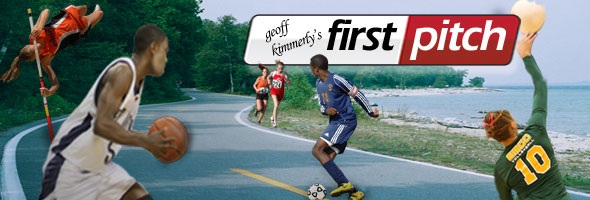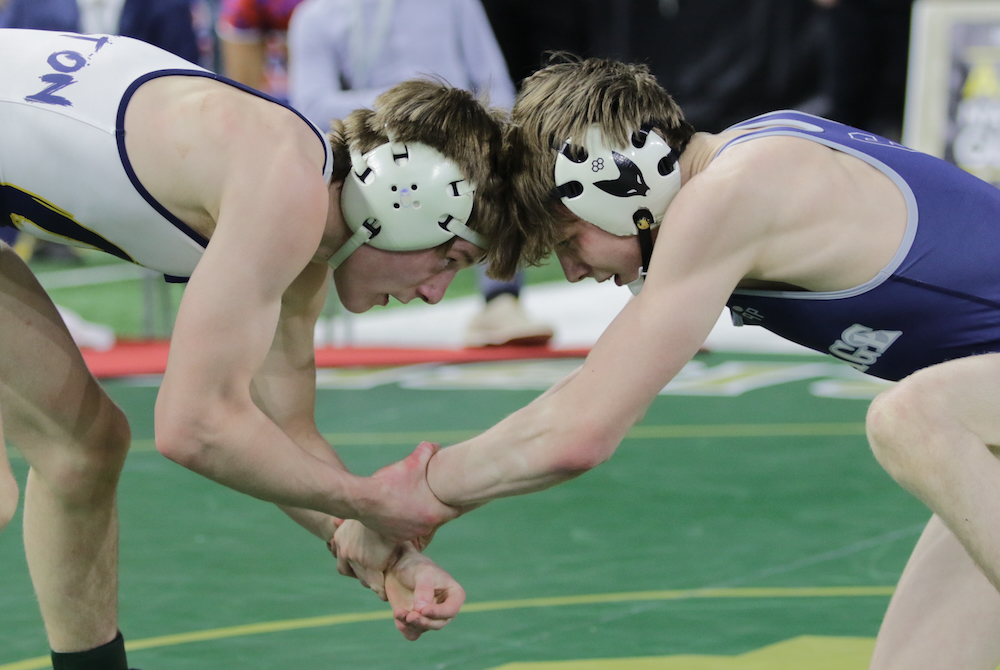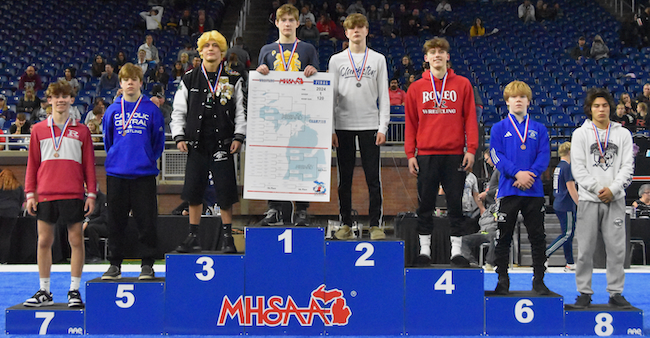
Keep on Coaching
February 1, 2013
By Geoff Kimmerly
Second Half editor
A few weeks ago, I finally got my first chance this season to watch a friend coach his basketball team. After guiding some others at the lower levels, this is his first time running the varsity – something he wasn't sure he wanted to do with a 1-year-old just learning to walk, but a challenge he ended up taking on to the benefit of all those involved.
Simply put, he’s good. I've seen a lot of teams and a lot of coaches over the past 15 years, and although I wouldn't know much of what to do if I were walking the sideline, I felt pretty qualified in telling him I was impressed – even if he didn't buy that I was offering an unbiased opinion. The best news is he’s gone from not sure about this a few months ago to talking about next season.
We know, at least anecdotally, that coaching continues to get more challenging. The time commitment has grown substantially to make running a program a year-round endeavor in a lot of sports at a lot of schools.
That commitment – especially for coaches with children of their own – was a main reason referred to in a New Haven Post-Chronicle story Saturday that noted 23 football coaching openings in Connecticut at one point this offseason. That state has 146 football teams – meaning roughly 15 percent will have new leaders this fall.
And that got me thinking about my friend, about how glad I am he’s given this a shot, and how I've seen so many others either not do so, or not stick around long despite having some pretty nice success.
A study published last winter in Interscholastic Athletic Administration magazine – a product of the National Interscholastic Athletic Administrators Association – noted some predictable results of a study that sought to determine the biggest challenges faced by first-year high school coaches.
The toughest according to the study was balancing the demands of coaching and teaching, experienced by nearly half the respondents – 98 percent of which coached high school teams and 81 percent of which are teachers.
The next six reasons all were noted by at least 30 percent of those in the study – personal fatigue, securing community support, securing and caring for facilities and equipment, parental contact, keeping non-starting players motivated, dealing with schedule interruptions and motivating athletes to achieve consistent, peak performance.
Nothing there is earth-shaking, and most if not all of these challenges are faced by high school coaches regardless of how long they've been in the field. But I got a little more perspective from some of the 32 items that ranked as least challenging to the first-year leaders – keeping in compliance with state and league regulations, dealing with substance abuse issues, teaching sport skills and creating a positive team atmosphere – things that seem most important, and yet appear to be easiest to do. I’m not sure what that tells us – but I think it tells us something.
Click to check out the entire three-page breakdown of the study, plus the researchers’ recommendations to remedy some of what first-year coaches face.
Giving back to Saginaw
I love reading about high-level athletes – like a star-studded group of alums from Saginaw – giving back to where they got their starts.
Pittsburgh Steelers star LaMarr Woodley made a big impact before the start of this school year by donating $60,000 to cover all participation fees for athletes in his former school district. The Saginaw News’ Hugh Bernreuter writes today about how Woodley (Saginaw High), the Philadelphia 76ers’ Jason Richardson (Saginaw Arthur Hill) and former Oakland Raiders standout Stu Schweigert (Saginaw Heritage) have combined to give more than $865,000 back to their home communities.
Bernreuter also mentions the non-monetary contributions of the Golden State Warriors’ Draymond Green (Saginaw High) and former Indianapolis Colts receiver Blair White (Saginaw Nouvel).
Click to read more about it.
Quote(s) of the Week
While rifling through more papers on my desk, I found an article from the Washington Post from Sept. 2011 titled “How high school sports save our schools.” I was drawn to it in part because I spent more than a decade in a newsroom, and it was a piece by a reporter covering education who instead of reporting on school boards and the like, delved into the importance of interscholastic athletics to education as a whole.
He spoke of how participation continues to grow even as resources dwindle, and of data supporting that extracurriculars like sports are more effective than academic classes in teaching leadership, teamwork, time management and “other skills crucial for success in the workplace.” Later, he mentioned a study noting that those who participate in extracurriculars earned more a decade later.
Click here to read the entre piece. These passages struck me most.
“Coaches might be the only faculty members still allowed by our culture and educational practice to get tough with students not making the proper effort. They have the advantage of teaching what are essentially elective non-credit courses. They can insist on standards of behavior that classroom teachers often cannot enforce because the stakes of dismissing or letting students drop their courses are too high. …
“Students do better in activities they choose. If we provide more of them, led by committed adults … that can make a difference. We know the bad news about education. Dropout rates are high. Achievement scores are stagnant. But sports participation is going up, despite pressure to cut it back. Let’s cheer about that and look for a way to draw in more students.”

After Finals Face-Off, Teammates Working to Earn Championships Together
By
Keith Dunlap
Special for MHSAA.com
January 3, 2025
Clarkston senior wrestlers Archer Anderson and Preston Lefevre hope to do something this season that they couldn’t last year – spur each other on to Individual Finals titles.

So, why couldn’t they do so last year? Because only one of them could win it all.
Anderson and Lefevre both advanced through last year’s Division 1 Individual Finals field at 120 pounds to reach the championship match, where they ended up running into … each other.
The two squared off for the title in a battle of teammates, with Anderson earning a 10-8 win in overtime.
“It was pretty cool,” said Anderson, recalling the match during the first day of this season’s Oakland County meet last month. “It was really tough because you know exactly what he was going do. But that was in the past. We are just trying to get better and focusing on improvement.”
Added Lefevre: “I wouldn’t say it was awkward as much it was bittersweet. It was cool that one of us got to win.”
This year, it’s possible both will celebrate Finals championships.
The two started this winter in different weight classes, with Anderson wrestling at 126 pounds and Lefevre at 132.
“Whatever weight is best for the individual, that’s where they are going to go,” Lefevre said. “We just figured out that 126 and 132 was where we were going to be. I just got bigger.”
At the Oakland County tournament, Anderson won the title at 126 pounds, while Lefevre advanced to the championship at 132 pounds before losing to Jace Morgan of Rochester Adams. Morgan was a semifinalist at 126 pounds at last year’s MHSAA Tournament and has signed to wrestle for Michigan State.
Both Anderson and Lefevre look primed to be among the best in the state in their weight classes. They had an active offseason, with both competing among other decorated high school wrestlers at the Super 32 Challenge in North Carolina in October.
“We got some chances at some nationally-ranked wrestlers, so that was fun,” Anderson said.
 Anderson and Lefevre both were voted team captains, and both have embraced the extra responsibility of leading the others on the squad.
Anderson and Lefevre both were voted team captains, and both have embraced the extra responsibility of leading the others on the squad.
“Just trying to get better and we’ve been setting a good example for the underclassmen,” Anderson said.
Of course, that starts with leading by example with how they train with each other every day in practice.
The weight classes might have changed, but the fact that the two are still training partners and go at it regularly hasn’t changed a bit.
It’s all for the best though, where their technique, and physical and mental toughness is honed.
“Iron sharpens iron,” Lefevre said. “We are in there every day scrapping and getting better. Everything gets better. Even your mindset. I got to hate losing.”
Clarkston head coach Brian Gibbs has seen the two push each other in practice ever since they were freshmen, and it will obviously be a strange sight not to see them do so in the Clarkston wrestling room once they graduate.
“They have been true competitors year over year and continually work on refining their craft,” Gibbs said. “The fact they finally wrestled each other in the state finals has only increased their competitiveness and drive to be better. They are great friends and drill partners. Both of them have done tremendous things for this program, and I’m extremely grateful to have them with us.”
Having two of the state’s top wrestlers in the lower weights is an advantage many teams don’t have, and both Anderson and Lefevre hope that means they’ll take Clarkston to a place the Wolves haven’t been during their high school careers – the Team Finals in Kalamazoo.
“It’s been a goal of ours to make states because we haven’t done it,” he said. “That’s always been a goal.”
Whether or not Clarkston is in Kalamazoo as a team, expectations are Anderson and Lefevre will once again be center stage at Ford Field for the Individual Finals.
This time though, the plan is for both to be raising an arm in victory after the championship match.
 Keith Dunlap has served in Detroit-area sports media for more than two decades, including as a sportswriter at the Oakland Press from 2001-16 primarily covering high school sports but also college and professional teams. His bylines also have appeared in USA Today, the Washington Post, the Detroit Free Press, the Houston Chronicle and the Boston Globe. He served as the administrator for the Oakland Activities Association’s website from 2017-2020. Contact him at [email protected] with story ideas for Oakland, Macomb and Wayne counties.
Keith Dunlap has served in Detroit-area sports media for more than two decades, including as a sportswriter at the Oakland Press from 2001-16 primarily covering high school sports but also college and professional teams. His bylines also have appeared in USA Today, the Washington Post, the Detroit Free Press, the Houston Chronicle and the Boston Globe. He served as the administrator for the Oakland Activities Association’s website from 2017-2020. Contact him at [email protected] with story ideas for Oakland, Macomb and Wayne counties.
PHOTOS (Top) Clarkston teammates Archer Anderson (left) and Preston Lefevre compete against each other for the Division 1 championship at 120 pounds last season. (Middle) Archer and Lefevre top the awards podium at Ford Field. (Click for more from High School Sports Scene.)

